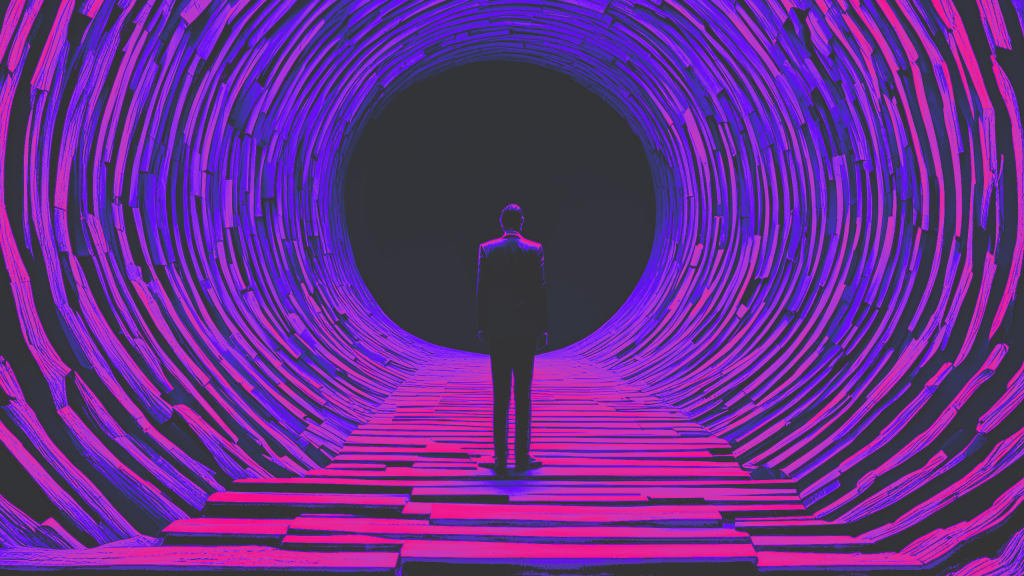The morning after the election, I told myself to stay off my news feeds and social media accounts—it’d be the most “self-care” thing I could do. But it was exactly what I did not do. Part of me was searching to see if the result, and its implications for myself and my daughters as women of color, was all really true. Another part was looking for community, to validate that I was not alone in my despair, my deep shock that most of our country had chosen hate and chaos rather than humanity. Reading the shared experiences of others was a balm. I was not alone.
As I thumbed through my Instagram feed, nodding at the postelection takes and the cries of grief, one post stopped me. A video from a right-wing influencer, spouting the words “Your body, my choice.” I watched him chant the words with such enthusiasm, confidence, and ease. The video had already gotten millions of views.
I wish I could put into words what this felt like. How it felt in my chest and the tips of my fingers. My heart was no longer open, finding comfort in the words of social connection and community. Fear stung my body like pins and needles. I felt small. Stuck. Limited.
I knew these physical and emotional manifestations well—they’ve been a sharp and unexpected visitor that sucks my heart back in time.
As a victim of sexual assault, I have spent years in trauma therapy, examining my experience: my abduction and rape, the victim shaming I experienced from the police after I was found, and the resulting pregnancy I had to deal with on my own as a 16-year-old girl.
As an activist, I have worked with communities across the country to push back on some of our country’s most heartbreaking issues, including gun violence and paid family leave. And as the founder of Rosie, a nonprofit storytelling agency I’ve been leading since 2018, I work daily to shift the stories that shape our culture and values, and how people understand the world and their role to make it more loving, connected, and equitable.
Despite all the work I had done, here I was, falling back into the toxic narratives that have threatened to keep me small. Stuck. Limited. I knew these ideas could either break me or give me the strength to move forward. Both choices had to do with the mindset I could embrace: a scarcity mindset, or abundance. In the world that we live in, it is easy to fall into a scarcity mindset—a lens that is shaped by a world that has told us, time and time again, who we are, who belongs, and who does not.
The scarcity mindset is all around us. It influences everything about how we live, see, and think about ourselves. Our news feeds bombard us with clickbait that disproportionately “others” people of color and anyone who does not fit into a status quo version of the world. We see a blinding whiteness in storytelling that misses the nuances and intricacies of our lived experiences. The deficit language that is used to describe people focuses less on our aspirations and more on our challenges, triggering associations in our subconscious that often tie the problem to a marginalized person or their community’s identity. How we put these concerns into words often encourages one-dimensional stereotypes and accusations on one side, and distorts our sense of self on the other.
We live and breathe this double consciousness, warring ideals of who we are and who the world wants us to be. But at some point, we move away from standing firm in our stories. We lick our wounds, tuck away the trauma, and move on from it—theoretically.
The scarcity mindset is how we tell a fundamentally American tall tale about a nation built on notions of individualism; a male-dominated story filled with loners who suck it up and ride off into the sunset as others applaud our resilience. We don’t quite realize that denying ourselves the breadth of our stories denies our full human experience and the processing required to embody ourselves.
My daughters Lily and Violet—7 and 3 years old—often remind me that we don’t come into this world like this. We have a strong sense of who we are, what we believe, and the choices we want to make. And this return to who we are and all we can be starts with telling our own stories from a place of abundance.
Shifting our stories from scarcity to abundance honors the fullness of our humanity. It allows us to reclaim the truths inside of us, and declare that we are so much more than we are confined to believe. We are more than pain and suffering. We are worthy of care and love. Our storytelling is an investment in our collective liberation—our push to create a world we all deserve. Our work is our storytelling.
The question, however, always is: Where do we begin? Here are several crucial steps to move past the scarcity mindset, and the fear of vulnerability and judgment, to free ourselves and our stories.
Question the stories you’ve internalized about yourself, and form new truths: Self-discovery doesn’t always require therapy—the resources are right in front of you. Find a quiet and safe space to turn inward, and reflect. I often return to these questions:
- What stories have I been living in, and for how long?
- How has this shown up in my life?
- How is this different from who I really am?
Seeing clearly how each truth refutes a specific misperception can help you explore how these thought constructs have ruled your decisions and choices throughout your life. Set a practice to return to these truths daily, or as often as necessary, to remind yourself of who you are, your power, and your potential. The world will continue to try to challenge, confine, disrupt, and conquer us. It’ll never be easy to combat this with our own truth, but it’ll always be necessary.
Become conscious of rigid constructions in daily life and advocate for the stories that are missing: So much about how we move through the world is based on the stories we’ve been conditioned to believe. Be aware and mindful of the reductive messages all around you, and push yourself to consider the missing people and perspectives.
Note that the call is not only to take notice. We have to make a concerted effort to advocate for the hidden stories. Advocacy can look like a lot of different things. We can ask why when we see stories told through a scarcity lens. We can read diverse books that center people of color, by people of color, and uplift them with whatever platforms and privileges we hold. We can add perspective when we find ourselves in conversations that lack nuance.
Without this, we can only tell limited stories about our humanity and lived experiences, and accordingly limit our perspective on the issues, and the solutions, of our time. We are all so much more than that.
Find your people: Octavia Raheem, a rest coach for Black, Indigenous, and women of color who are senior leaders, founders, and business owners, once told me that “to find your truth, you must hear it.” When we gather in community, whether it’s with one friend or a text thread with others, and we share our stories and witness others, we learn that we are not alone. We are all suffering under the weight of capitalist, racist, and sexist systems. Our exhaustion and isolation from these systems just keep us from recognizing it. But when we share, we experience revelations in belonging, create expansive language for our feelings, and make meaning out of our experiences and paths forward. This is how we find our way back to each other.
It is an ongoing shift of the heart and mind to break away from embedded narratives and patterns. I continuously exercise that muscle of trust within myself. But as I continue mapping my blueprint to liberation, I return to our stories.
Storytelling is an entry point into our humanity. Shifting from a scarcity mindset to the abundance we speak of reminds us of who we are, our power, and our potential. Systems of oppression will take generations to dismantle, so it is up to us to start now, with our truth. We build regenerative and collective power by elevating our experiences, one at a time, until our collective voice soars over the mountaintops, and it is only our truth that we hear.
The early-rate deadline for Fast Company’s World Changing Ideas Awards is this Friday, November 15, at 11:59 p.m. PT. Apply today.







